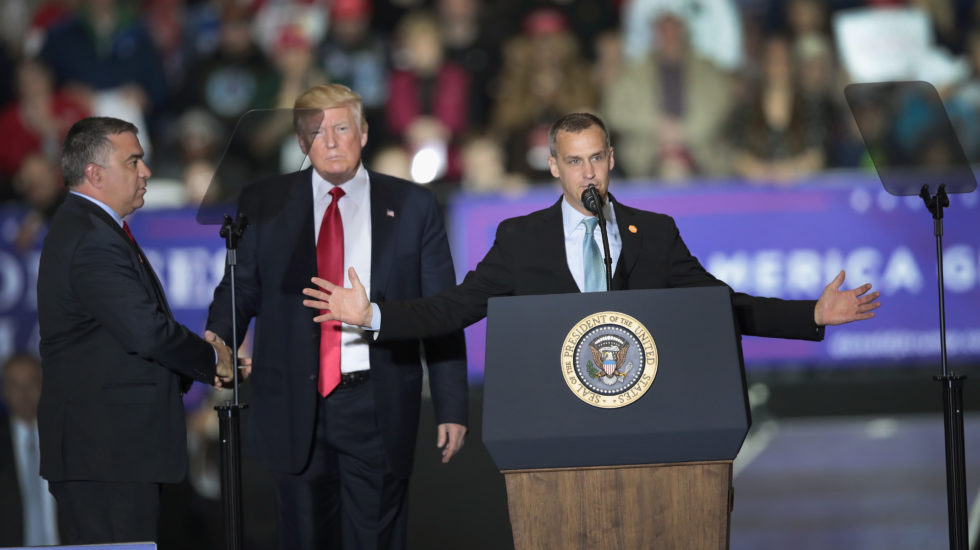On Tuesday, Sept. 17, Trump’s former campaign manager Corey Lewandowski is scheduled to testify before the House Judiciary Committee. He says he’s happy to appear: “I want to explain that there was no collusion, there was no obstruction.”
That’s interesting because Lewandowski provided special counsel Robert Mueller with all of the evidence necessary to prove that Trump obstructed justice. (Vol. II, pp. 11-12, 92-93, 97-98) If Lewandowski lied to Mueller, he committed a felony. If he lies to Congress, that would be a crime too. And new House rules make it difficult for him to toe the party line without falling into one of those legal abysses.
Someone close to Trump must have seen the problem. On the eve of his testimony, White House counsel Pat Cipollone wrote to the committee that “the White House has directed Mr. Lewandowski not to provide information about such communications [with Trump] beyond the information provided in the portions of the [Mueller] Report that have already been disclosed to the Committee.”
Trump’s last-minute invocation of “executive branch confidentiality interests” to limit Lewandowski’s congressional testimony won’t help Trump’s core problem: Lewandowski has already provided Mueller with an incriminating first-hand account of Trump’s obstruction. And even armed with the new White House letter, Lewandowski has no basis for refusing to repeat that story to the committee.
Lewandowski’s Foray Into Obstruction
The crime of obstructing justice requires: 1) corrupt intent; 2) an obstructive act; and 3) a connection to a pending or contemplated official proceeding. The law covers failed attempts as well as successful efforts. (Vol. II, pp. 9-12) Based on Lewandowski’s reported interviews with Mueller, Trump touched all the bases. (Vol. II, pp. 90-93, 97-98)
From the Trump-Russia Timeline:
June 19, 2017: Lewandowski — a private citizen — meets one-on-one with Trump in the Oval Office. He takes notes as Trump dictates a message to Attorney General Jeff Sessions that he asks Lewandowski to deliver. It directs Sessions to give a speech declaring that Trump has done nothing wrong and that Mueller should forget about Russia’s 2016 election interference. Sessions is to limit the investigation to future elections only.
Lewandowski arranges a meeting with Sessions where he will deliver Trump’s message personally. But Sessions cancels at the last minute, so the message remains undelivered. Lewandowski leaves town and places his notes of Trump’s directive in a safe at home.
Later in June: Lewandowski asks Rick Dearborn, Trump’s deputy chief of staff (and Sessions’ former chief of staff), if he will pass a message on to Sessions. Not knowing what it says, Dearborn agrees to deliver it at a late July dinner with Sessions.
July 19: Trump meets again with Lewandowski alone in the Oval Office and asks if he has delivered the message yet. Lewandowski says that it soon will be. Trump tells Lewandowski to inform Sessions that if he refuses to meet, Sessions will be fired. After the meeting, Lewandowski gives Dearborn a typed copy of the message, which he’d asked Hope Hicks to type.
Dearborn later informs Lewandowski that he had handled the situation, even though Dearborn never actually delivered the message to Sessions. At least, that’s what Dearborn told Mueller.
At the same time that it directed Lewandowski not to answer certain questions from the House Judiciary Committee on Sept. 17, 2019, it also directed Dearborn and Rob Porter — another former White House aide with first-hand knowledge of Trump’s obstruction — not to appear at all.
New House Rules
Lewandowski will be the first witness to testify under new rules that the House Judiciary Committee adopted on Sept. 12. As before, individual members will have their usual five minutes each to pose questions and/or make self-serving speeches. But then the committee’s majority and minority counsel will each get an additional 30 uninterrupted minutes to examine the witness.
That means lawyers with actual trial experience in controlling belligerent witnesses will have a chance to elicit a clearer and more complete narrative for the public to see and hear. Uncooperative witnesses will have difficulty evading, obfuscating, and grandstanding.
Lewandowski’s Moment
While watching Lewandowski, keep a close eye on Trump too. After receiving his subpoena on Aug. 15, 2019, Lewandowski appeared with Trump at a rally in New Hampshire where he is considering a run for the US Senate. Trump told the crowd that Lewandowski “would be fantastic.”
Fantastic can mean “spectacular and sensational.” It can also mean “without adherence to truth or reality.” What will it be? Watch Lewandowski as he plays to an audience of one. Trump may not like what he sees.
Steven J. Harper is a regular contributor to News & Guts and the creator/curator of the Trump-Russia Timeline. He’s an attorney, adjunct professor at Northwestern University Law School, and author of several books, including Crossing Hoffa — A Teamster’s Story and The Lawyer Bubble — A Profession in Crisis. He blogs at The Belly of the Beast. Follow him on Twitter (@StevenJHarper1).



